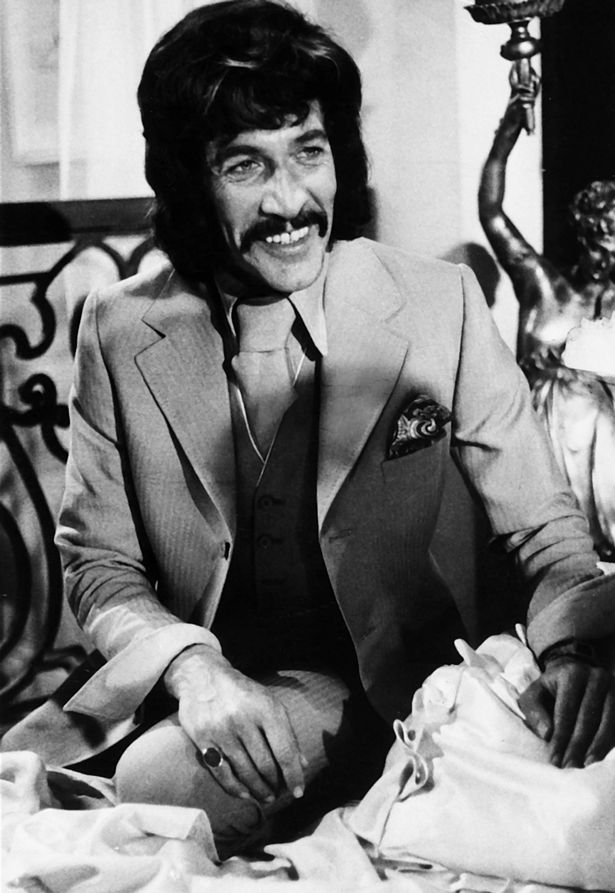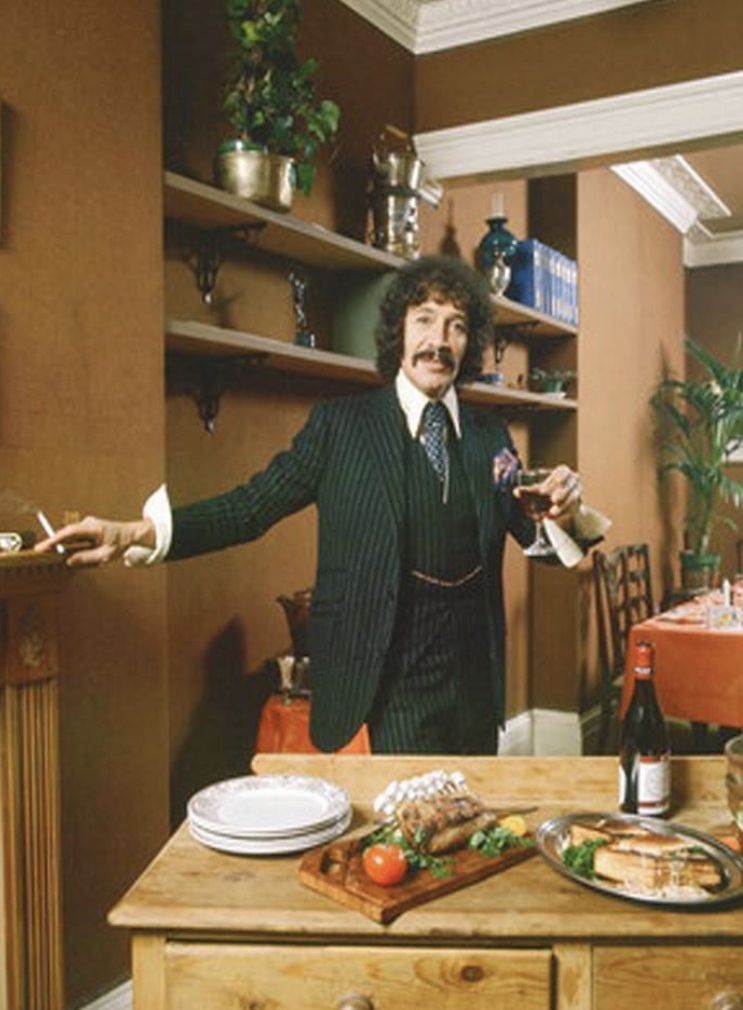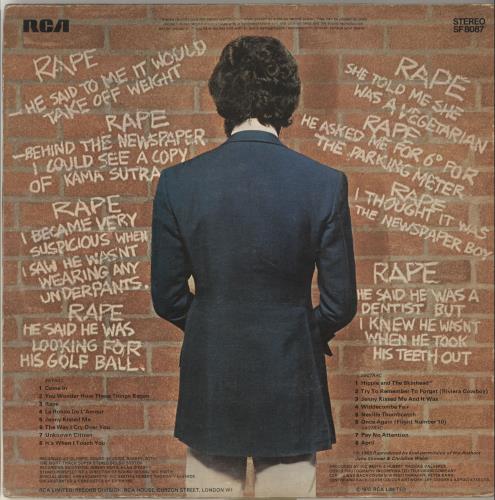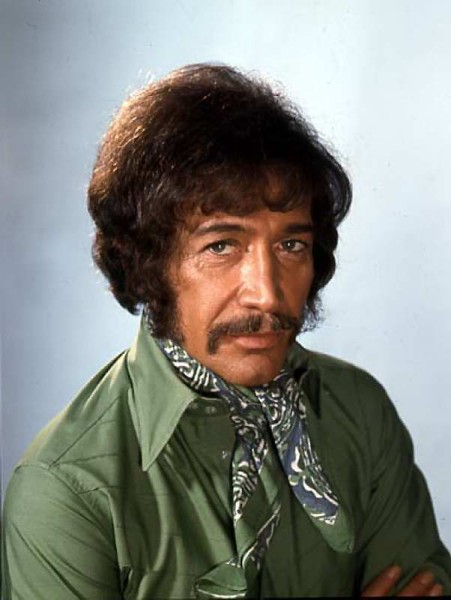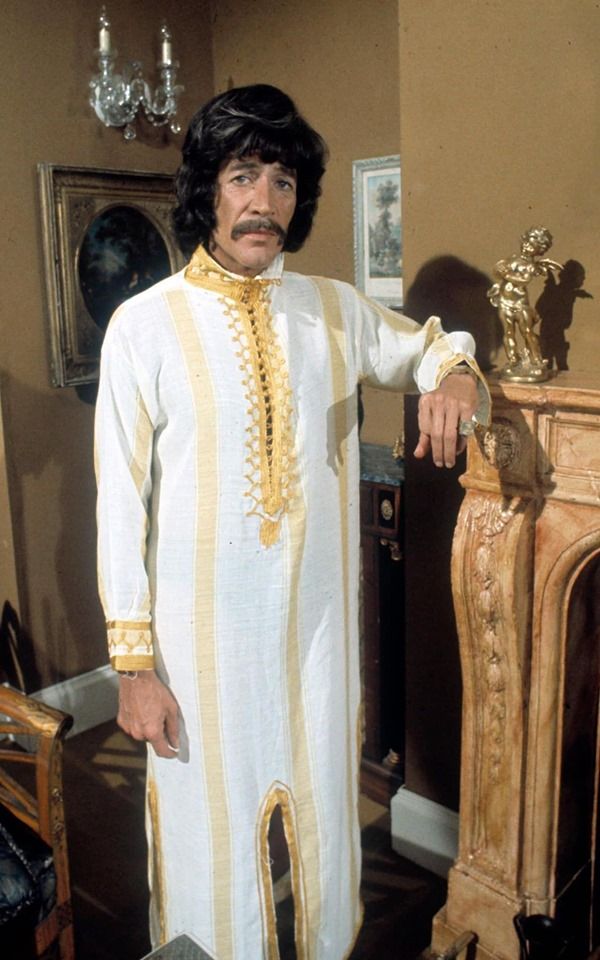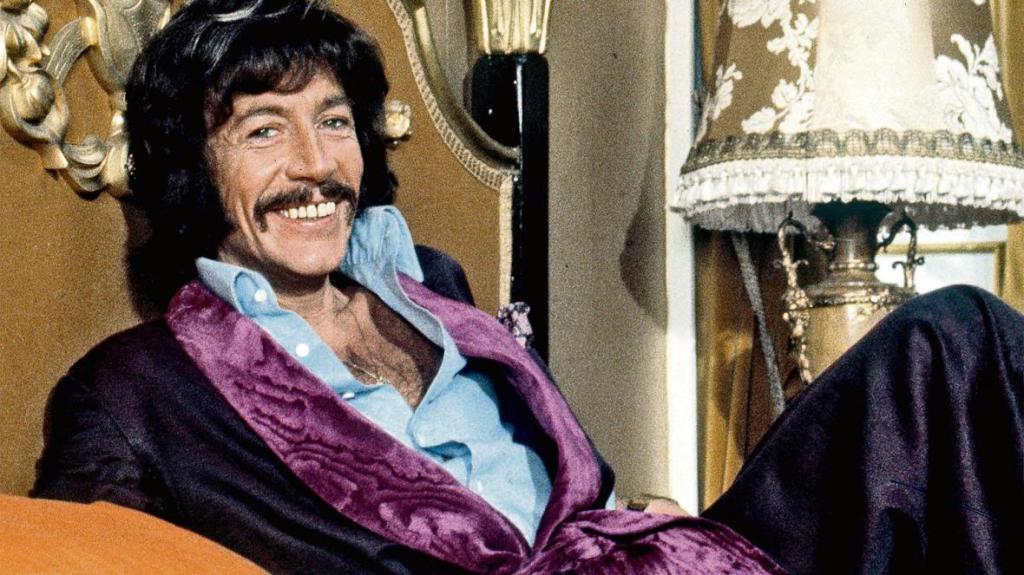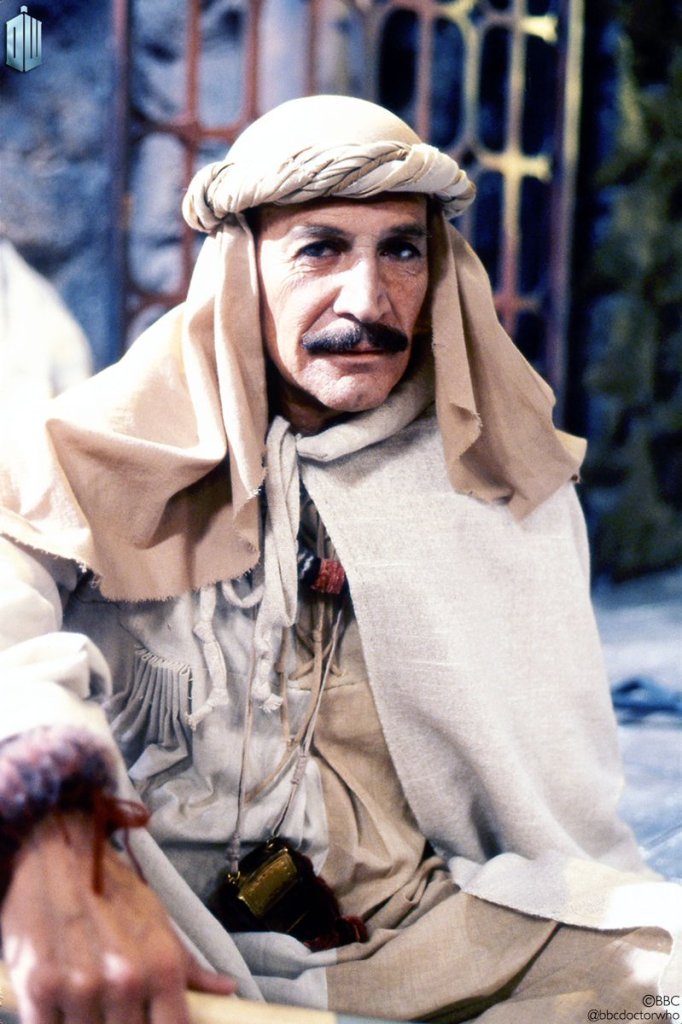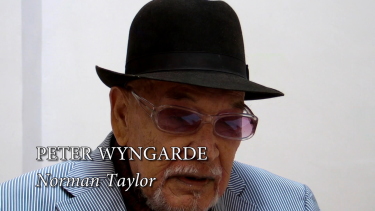“Watch that young man. He is the best emerging actor in the country!”
Sir Tyrone Guthrie – Theatrical Director

Quality Street
Buxton Playhouse Theatre – 1946
Character: Ensign Blades
When We Were Married
Character: Gerald Forbes
The Embassy Theatre, London. July 1946
Pick-Up Girl
Character: Door Attendant/Policeman Owens/A Young Man.
British National Tour – Autumn/Winter 1946.
N.B. In earlier performances of ‘The Pick-Up Girl’, Peter was billed in the role of “The Door Attendant”, but was later credited in the part of both ‘Policeman Owens’ and ‘A Young Man’.
Present Laughter
Character: Morris Dixon
British Tour – Autumn 1947
Macbeth
Character: A Messenger/A Murderer
Colchester Repertory Theatre. February 1948
Deep Are The Roots
Character: Chuck Warren
Colchester Repertory Theatre. March 1948
The Winslow Boy
Character: Dickie Winslow
Colchester Repertory Theatre: 1st – 6th March 1948
The Government Inspector
Character: Osip
Royal Court Theatre, York. May 24th, 1948
Julius Caesar
Character: Julius Caesar
Royal Court Theatre, York. May, 1948
Residents Only
Character: Mr. Maydigger
Royal Court Theatre, York. June 1948
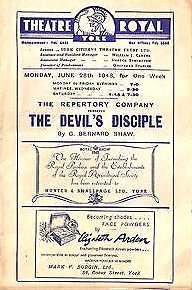
The Devil’s Disciple
Character: Chaplain Brundenell
Royal Court Theatre, York. June 1948
Fly Away Peter
Character: Pan
Colchester Reparatory Theatre: January 1949
The Importance Of Being Ernest
Character: Algernon Moncrieff
Colchester Reparatory Theatre: 14th – 19th February 1949
Rope
Character: Kenneth Raglan
Colchester Reparatory Theatre: 21st – 26th February 1949
Othello
Character: Sylvius
The Embassy Theatre. June 1949
N.B. Part of the Repertory Theatre Festival, held at the Embassy Theatre, Swiss Cottage, London between 31st May and 24th June, 1949. Companies from Bristol, Glasgow, Manchester and Nottingham took part. At the time, Peter was with the Nottingham Theatre Trust, based at the Nottingham Playhouse.
The Paragon
Character: The Unknown Man
Colchester Reparatory Theatre. January/February, 1949
As You Like It
Character: Oliver
Theatre Royal, Windsor. March, 1949
Tobias and the Angel
Character: Raguel
The Playhouse, Nottingham. April, 1949
By Candle Light
Character: Baron Egon Von Felsen.
The Playhouse, Nottingham. July, 1949
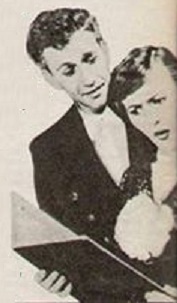
Above: Peter with Jenny Harvey in ‘By Candle Light’
The Apple Cart
Character: Nicobar, The Foreign Secretary
The Playhouse, Nottingham. July 1949
The Winslow Boy
Character: Sir Robert Morton
The Playhouse, Nottingham. July 1949
Fresh Fields
Character: The Chinese Servant
The Playhouse, Nottingham
The Merchant of Venice
Character: The Duke of Venice
The Playhouse, Nottingham
Shadow and Substance
Character: A Young Clergyman
The Playhouse, Nottingham
Othello
Character: Cassio
The Embassy Theatre, London. May-July 1949
The Happiest Days of Your Life
Character: Dick Tassell
The Richmond Theatre. January, 1950
The Long Shadow
Character(s): Miles & Piffard
The Richmond Theatre: January, 1950
Lovely To Look At
Character: Edward Winthrop
Richmond Theatre: February 1950
Edward, My Son
Character: Sergeant Kenyon
Richmond Theatre. February 1950
Mountain Air
Character: George Beesdale
Richmond Theatre. March 1950
P.C. 49 – The Case of the Shocking Shadow
Character: Andre Cheval
The Richmond Theatre. May 1950
The Magistrate
Character: Captain Horace Gale and Mr. Wormington
Richmond Theatre. May 1950
Claudia
Character: Jerry Seymour
The Richmond Theatre. June 1950
Goodbye Mr Chips
Character: Mr Chipping
The Richmond Theatre. July 1950
The Man From Toronto
Character: Robert Gilmour
Richmond Theatre, October, 1950
Someone At The Door
Character: Bill Reid
Richmond Theatre. October 1950
Bonaventure
Character: Willy Pentridge
Richmond Theatre, October, 1950
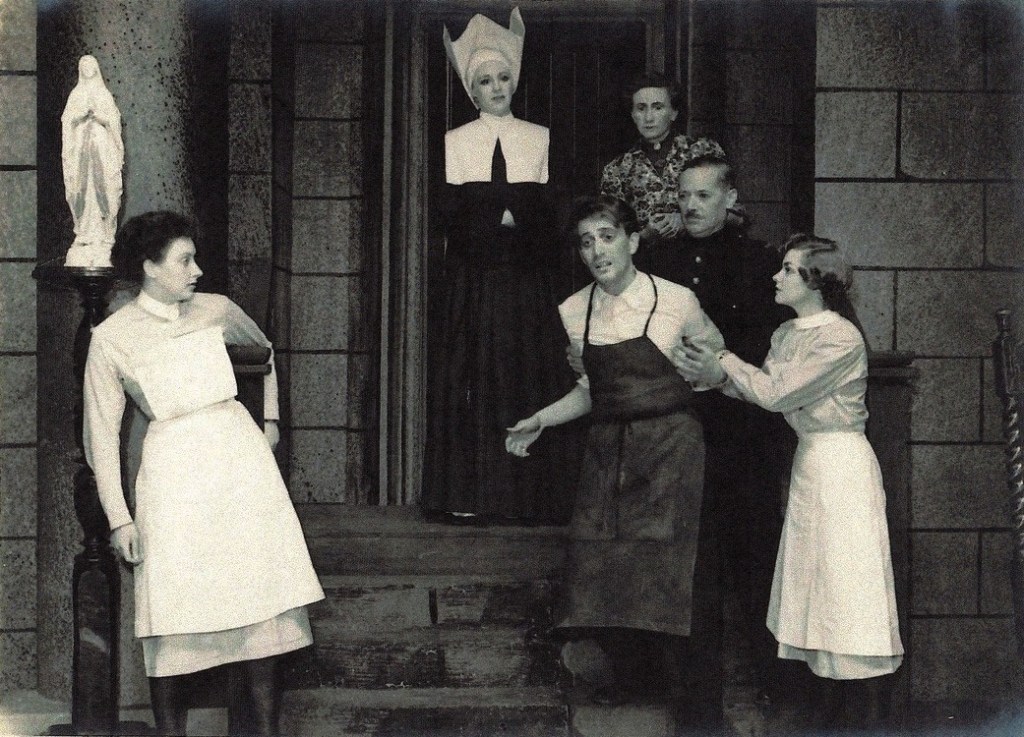
Above: Peter as Willy Pentridge, with cast in Bonaventure
Mr Gillie
Richmond Theatre, November, 1950
Character: Tom Donnelly
Hamlet
Character: Voltimand/Third Player
The New Theatre, Bromley. February 1951
N.B. This production of ‘Hamlet’ at the New Theatre, Bromley, was produced as part of the Festival Of Britain celebrations.
Loaves and Fishes
Character: Bertram Railing
The New Boltons Theatre Club, London. March 1951
The Taming Of The Shrew
Character: Tranio
The Marlow Theatre. May 1951
Ten Little Niggers
Character: Phillip Lombard
The Grand Theatre, Southampton, August 1951
French Without Tears
Character: Hon. Alan Howard
The Grand Theatre, Southampton, August 1951
The Happy Family
Character: Herbert Filch
The Grand Theatre, Southampton, September 1951
Love From a Stranger
Character: Nigel Lawrence
The Grand Theatre, Southampton, September 1951
Murder Without Crime
Character: Matthew
The Grand Theatre, Southampton, October 1951
Black Coffee
Character: Inspector Japp and Sir Claude Amory
Grand Theatre, Southampton, November 1951
Young Wives Tale
Character: Victor Manifold
The Grand Theatre, Southampton, November 1951
They’ll Arrive Tomorrow
Character: Jonah
The Irving Theatre, London. June 1952
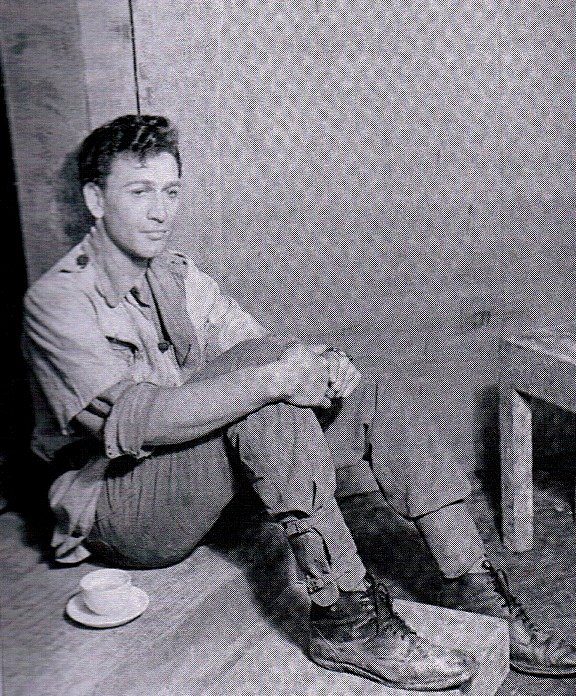
Above: Peter as Jonah
The Loyal Traitors
Character: The Communist
The Arts Theatre, London. January, 1953
September Tide
Character: Evan Davies
Marlow Theatre, Canterbury
No Laughing Matter (A.K.A. ‘Histoire de Rire’)
Character: Gérard Barbier
The Arts Theatre, London. July, 1954.
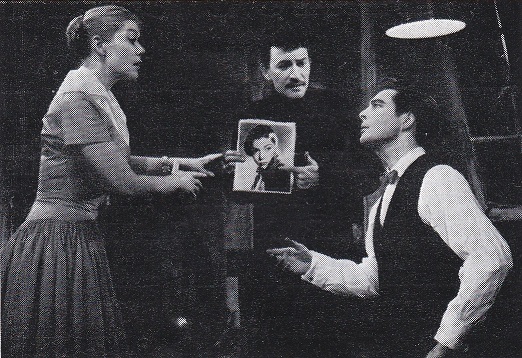
Above: Peter (Centre) in ‘No Laughing Matter’
The Enchanted (A.K.A. ‘Intermezzo’)
Character: The Ghost/A Young Man.
The Arts Theatre, London. March 1954
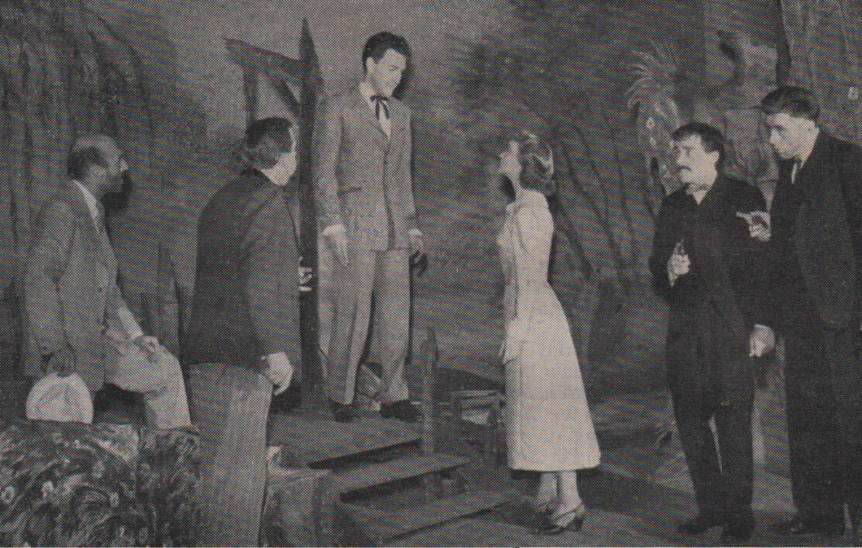
Above: Peter (centre, on steps) as the Ghost of a Young Man in ‘The Enchanted’
Saint Joan
Character: Dunois
The Arts Theatre, London. September 1954
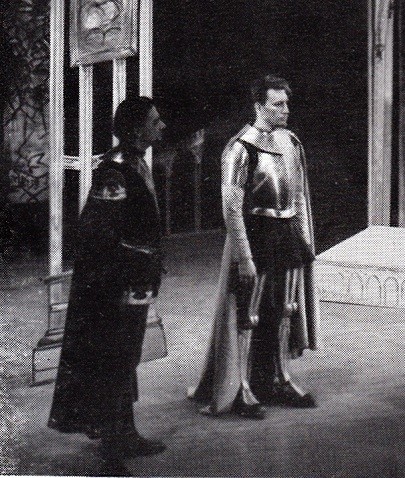
Above: Peter (right – in full armour) as Dunois
Journeys End
Character: Stanhope
The Irvine Theatre. July 1954
The Good Woman of Setzuan
Character: Yang-Sun
The Royal Court Theatre, London. October 1956
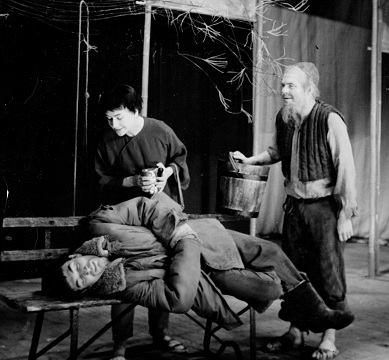
Above: Peter (lying) as Yang-Sun
Duel of Angels
Character: Count Marcellus
British Tour. April 1958/59
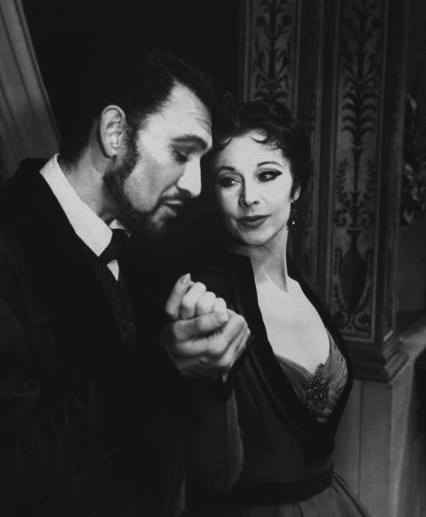
Above: Peter as Count Marcellus with Vivien Leigh
The Taming Of The Shrew
Character: Petruchio
The Old Vic, Bristol – February 24th – March 10th, 1959.
N.B. Recorded and shown by ITV (T.W.W.) in an edited 60-minute version on March 26th, 1959.
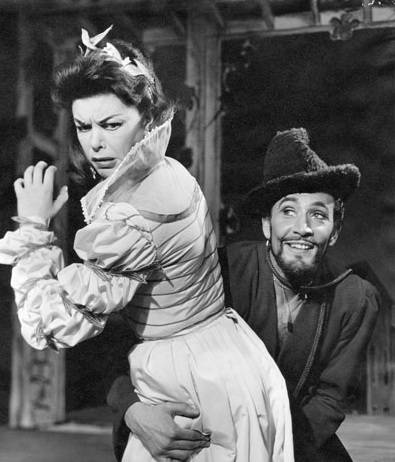
Above: As Petruchio in ‘The Taming of the Shrew’
Cyrano De Bergerac
Character: Cyrano
The Old Vic, Bristol – May 1959
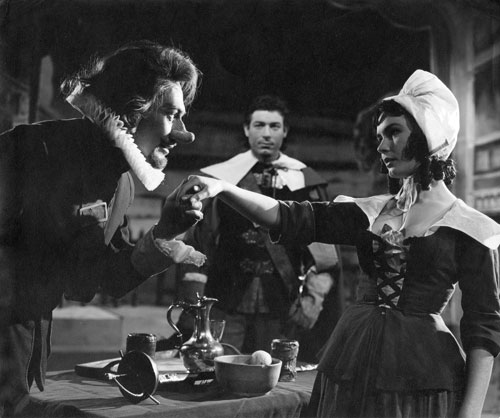
Above: As Cyrano in ‘Cyrano De Bergerac’
Duel of Angels
Character: Count Marcellus
American Tour. 1960

Above: Peter with Mary Ure in ‘Duel of Angels’
King John
Character: King John
The Mother House, London
The Merchant of Venice
Character: Shylock
The Mother House, London
Macbeth
Character: Macbeth
The Mother House, London
Night Conspirators
Character: Werner Loder
Regional Tour, 1964
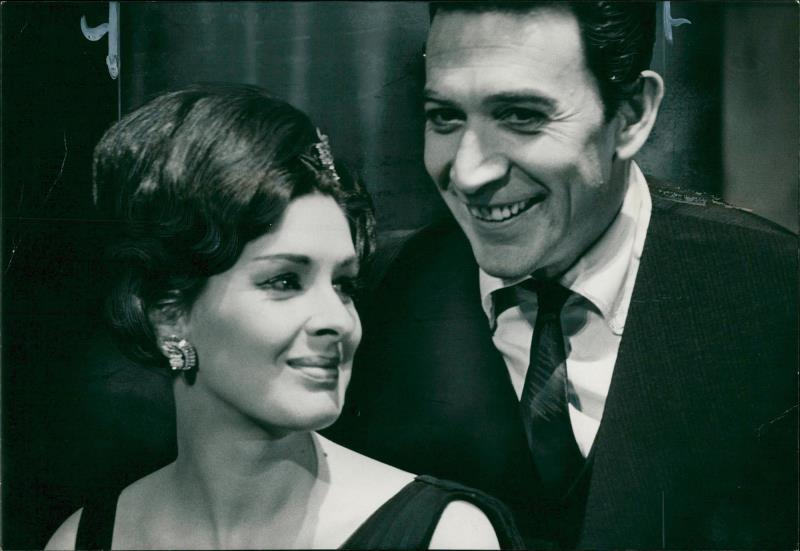
Above: Peter as Werner Loder, with Sally Home
Time Remembered (A.K.A. Léocadia)
Character: Prince Albert Troubiscoi
New Theatre, Bromley. September 1964
The Philanderer
Character: Leonard Charteris
The New Theatre, Bromley. June 1965
The Spies
Character: Chrystal
Richmond Theatre, May 1966
The Servant
Character: Barrett.
The Yvonne Arnaud Theatre, Guilford. September/October 1966.
The Duke of York’s Theatre, London
The Two Character Play
Character: Felice
The Hampstead Theatre Club. December 1967
N.B. The world premiere of the play was on December 11th, 1967.
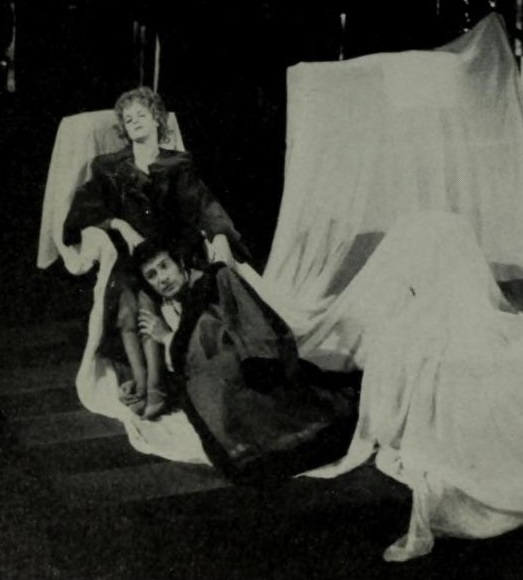
Above: As Felice in ‘The Two Character Play’, with Mary Ure
The Duel
Character: Nickolay von Koren
The Duke of York’s Theatre, London. April 1968
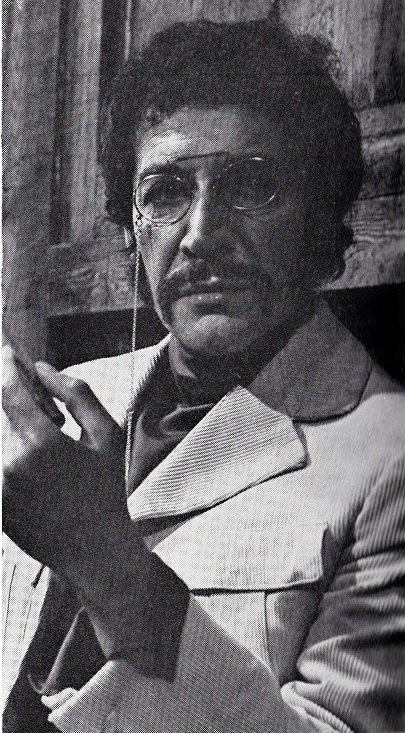
Above: Peter as Nickolay von Koren
Butley
Character: Ben Butley
The Metro Theatre, Melbourne, Australia. April 1971.
N.B. The production of ‘Butley’ at the Metro Theatre, Melbourne, was the World Premier of Charles Dyer’s play.
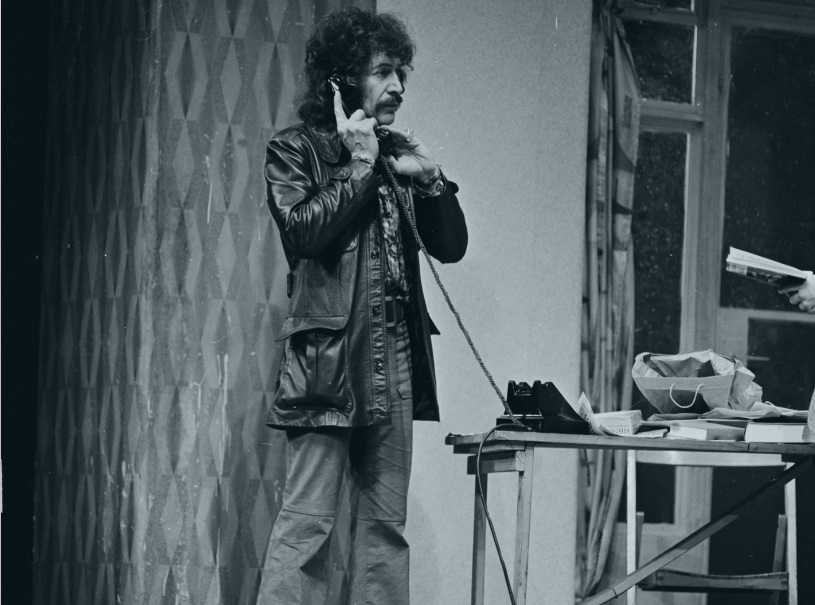
Above: Peter as Ben Butley
Mother Adam
Character: Adam
Regional Tour. August-November, 1972
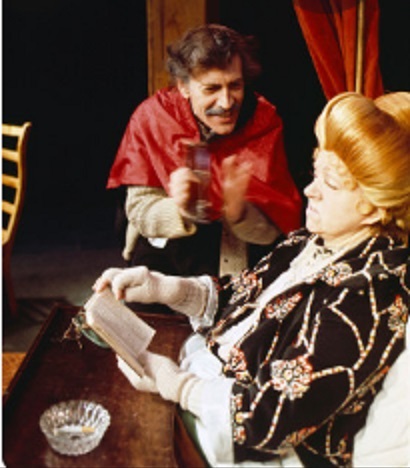
Above: Peter as Adam with Hermione Baddeley as his mother
The King and I
Character: The King
The Adelphi Theatre, London.
British National Tour: October – December, 1973
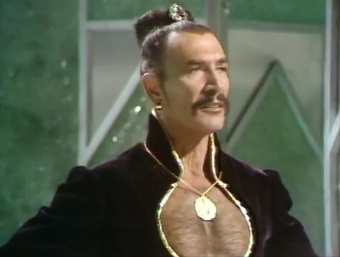
Above: Peter as the King of Siam
Present Laughter
Character: Garry Essendine
British National Tour. Autumn 1974
N.B. Peter also directed this play.
Dracula
Character: Vivorde Szekels/Count Dracula
British National Tour. Spring 1975
N.B. This play was written by Peter Wyngarde

Present Laughter
Character: Garry Essendine
The Yvonne Arnaud Theatre, Guildford
28th October to 15th November, 1975
N.B. Peter also directed this play.
The Merchant of Venice
Character: Shylock
British National Tour. March-April, 1976
Also directed by Peter Wyngarde
Dear Liar
Character: George Bernard Shaw
The English Theatre, Vienna. July, 1976
N.B. Play had to reopen in September to accommodate both the public and subscribers of the English Theatre who missed it earlier in the year.
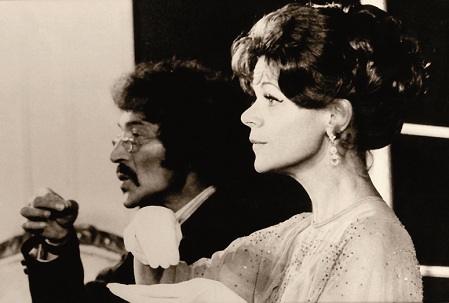
Above: As George Bernard Shaw in ‘Dear Liar’
Anastasia
Character: Prince Bounine
The Cambridge Theatre, London. September 1976.

Above: Peter as Prince Bounine
Big Toys
Character: Richie Bosenquet
The English Theatre, Vienna. July, 1977
N.B. European premier. Directing, casting and male costume designs by Peter.
The Merchant of Venice
Character: Shylock
The English Theatre, Vienna. August, 1977
N.B. Directed by Peter and recorded at the English Theatre, Vienna, by Austrian Educational Television
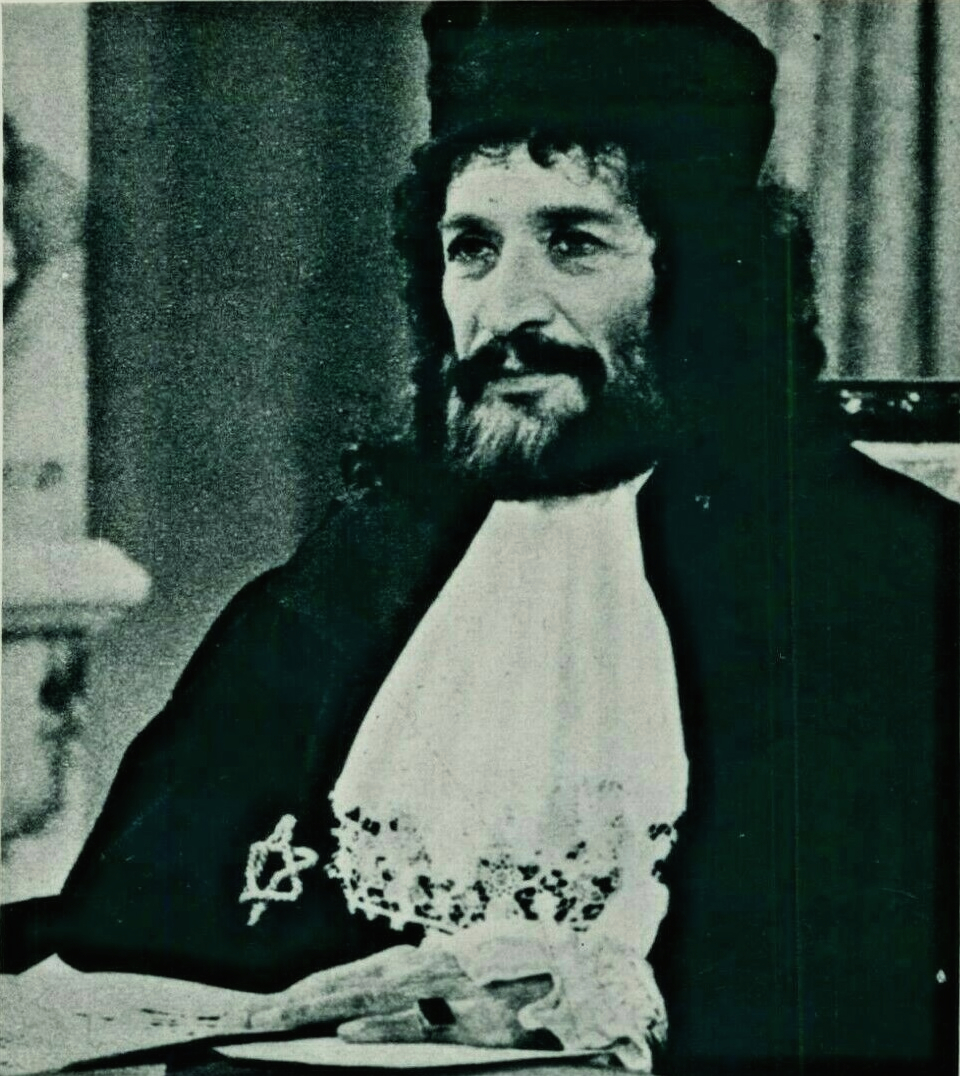
Above: Peter as Shylock
Deathtrap
Character: Sidney Bruhl
Tour of Southern Africa 1978
Underground
Character: Alexander Howard.
The Royal Alexandra Theatre, Toronto, Canada. March-May 1983
British Tour
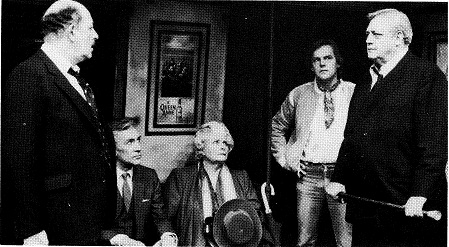
Above: (From left to right): Alfred Marks, Peter, Elspeth March, Eric Carte and Raymond Burr.
Light Up The Sky
Character: Carlton Fitzgerald
The Old Vic, London. September 1985.
Aladdin
Character: Abanazar
His Majesties Theatre, Aberdeen. December 1984/January 1985.
Babes In The Wood
Character: Sheriff of Nottingham.
Richmond Theatre. December 1985/January 1986.
Guilty Conscience
Character: The Prosecutor
The Theatre Royal, Windsor. June/July 1986.
Wait Until Dark
Character: Harry Roat.
The Mill Dinner Theatre, Sonning, UK. July 22 – August 22, 1989.
National Tour, South Africa. 1989
The Hilton International Hotel, Singapore: August 26th-September 2nd.
The Regent Hotel, Kuala Lumpar: September 4th-27th.
The Travel Lodge Hotel, Papua New Guinea: September 22nd-October 7th.
The Siam InterContinental, Bangkok: October 9th-13th.
The Nile Hilton, Cairo: October 18th-23rd.
The Jordan InterContinental Hotel: October 25th-28th.
The Athens Hilton, Athens: October 30th-November 3rd.
The InterContinental Hotel, Dubai: November 6th- November 13th.
The Hilton International Hotel, Manaman: November 15th-20th.
The Hilton International Hotel, Manaman: November 15th-20th.
The InterContinental Hotel, Muttrah: November 22nd-27th.
The InterContinental Hotel, Abu Dhabi: November 30th-December 4th.
The InterContinental Hotel, Al Ain: December 6th.
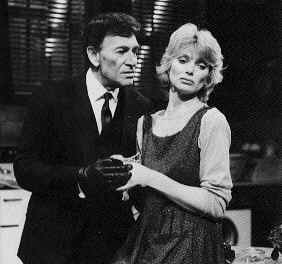
Above: As Harry Roat with Helen Gill in ‘Wait Until Dark’
As You Like It
Character: Duke Frederick
March/April 1988
UK National Tour
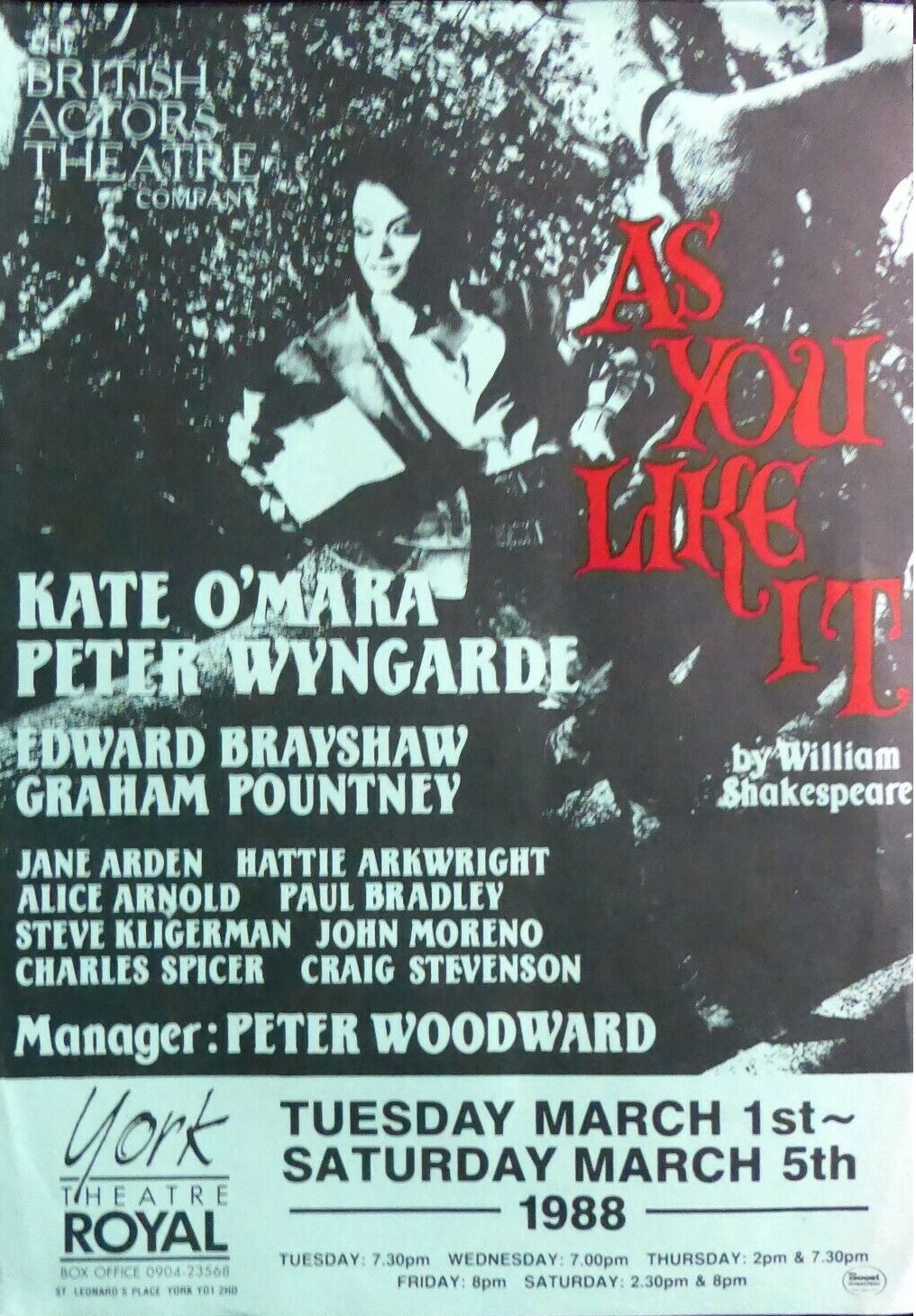
The Country Wife
Character: Jack Pinchwife
The Mermaid Theatre, London – December 1990

Above: Peter as Jack Pinchwife with Fenell Fielding as Lady Fidget
The Cabinet Of Doctor Caligari
Character: Doctor Caligari
The Playhouse Theatre, Liverpool – September 1995
N.B. Peter appeared in just one half of the opening night performance of ‘The Cabinet Of Doctor Caligari’ at the Playhouse Theatre in Liverpool on Tuesday, September 19th, 1995, before withdrawing from the show with a serious throat infection.
WYNGARDE PRODUCTIONS
Long Day’s Journey Into Night
Produced and Directed by Peter Wyngarde.
The Bristol Old Vic. March 17th – April 7th, 1959

DIRECTED BY PETER WYNGARDE
Time And The Conways
The Yvonne Arnaud Theatre, Guildford. December 1975
READINGS
A Celebration of Tudor Verse
Bishop Stortford Town Centre (Various locations)
23rd, 24th, 25th & 26th September, 1970
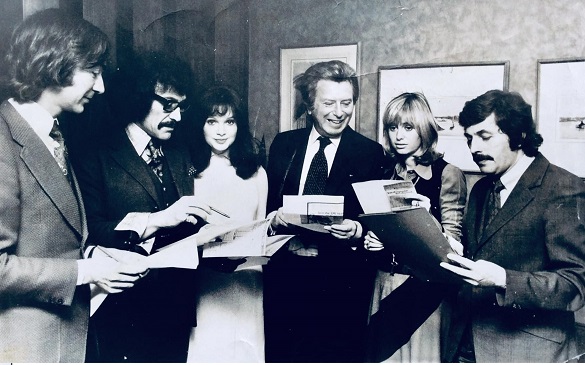
Peter with the other actors that took part in the performances, including Madeline Smith and Susan St. George
Water, Water Everywhere
Royal Pavilion Music Room, Brighton. 1974
(Part of the Brighton Festival. Theme: The Sea)
Click below for…
© Copyright The Hellfire Club: The OFFICIAL PETER WYNGARDE Appreciation Society: https://www.facebook.com/groups/813997125389790/




